Home
Home
>
Blog
Blog
>
1 Year Post-ChatGPT Job Study (With 6-Month Follow-Up)
1 Year Post-ChatGPT Job S...

Updated: July 11, 2024
1 Year Post-ChatGPT: Study Shows Old Job Mindset Prevails (Updated with 6-Month Follow-Up)
On November 30, 2022, ChatGPT's release captivated the world. Within just five days, it attracted over 1 million users, an unprecedented feat. This rapid rise sparked numerous predictions of doom.
The primary concern revolved around AI and automation potentially causing massive job losses. Many feared that AI systems could fully automate functions sooner than previously thought possible. Even creative professions seemed to be at imminent risk of extinction.
The rapid advancement of AI also raised alarms about workers' ability to keep pace. There was a growing belief that current educational and vocational training systems might be ill-equipped to manage the dramatic changes in job requirements.
A year after ChatGPT's debut, we conducted a study to explore how job seeker behavior towards traditional remote roles has evolved, if at all. Six months later, we've added a follow-up analysis comparing these trends, offering important insights for public discussions and media narratives on AI's influence on job-seeking behavior.
Methodology
For our research, we utilize Google Trends to analyze a sample of web searches. Google Trends is an invaluable tool for detecting new or evolving trends in user behavior. It helps identify which search terms are becoming more popular, offering a window into shifts in user interests and preferences.
Understanding Google Trends Data
In Google Trends, data points represent the search volume of a query relative to the total number of searches within a specific time frame and geographic region. This data is normalized and presented on a 100-point scale, where 100 represents the peak popularity of a term. The scale is relative: a score of 0 indicates no interest, and a score of 100 signifies the highest popularity. For instance, a value of 25 suggests that the term's search volume was a quarter of its maximum on that date.
Time Range Analysis
Our methodology involves comparing web search trends from two distinct periods: December 05, 2021, to November 30, 2022 (360 days before ChatGPT's initial release date) and November 30, 2022, to November 25, 2023 (360 days after ChatGPT's initial release date). Although this method isn't a definitive predictor of future trends, analyzing search term patterns can offer valuable predictive insights into emerging interests and priorities.
The Hypotheses
Our study aims to investigate the impact of ChatGPT and AI on job seeker behavior online over the past year by examining four widely recognized hypotheses:
- The advent of AI is anticipated to create new job roles. We hypothesize that this will spark increased interest among job seekers in these emerging AI-related positions.
- AI is expected to render jobs focused on repetitive, easily automated tasks obsolete. We hypothesize that this will result in a decline in job seekers' interest in traditional remote roles of this nature.
- It is anticipated that AI will have a substantial effect on the creative industry. We hypothesize that this will cause a decrease in job seekers' interest in these creative professions.
- The ongoing advancements in AI highlight the need for continuous learning and skill development. We hypothesize that this will generate increased interest among job seekers in AI-related learning and reskilling opportunities.
Our research will assess the validity of these hypotheses based on the data and trends observed.
Hypothesis #1: Heightened interest among job seekers in AI-related roles.
The emergence of artificial intelligence is expected to introduce new job roles that previously did not exist. We hypothesize that this development will significantly heighten job seekers' interest in these innovative AI-related roles. To validate this hypothesis, we will analyze the trend in keywords related to AI jobs during the predefined period. The keywords selected are AI Jobs, Prompt Engineering, and AI Trainer.
AI Jobs
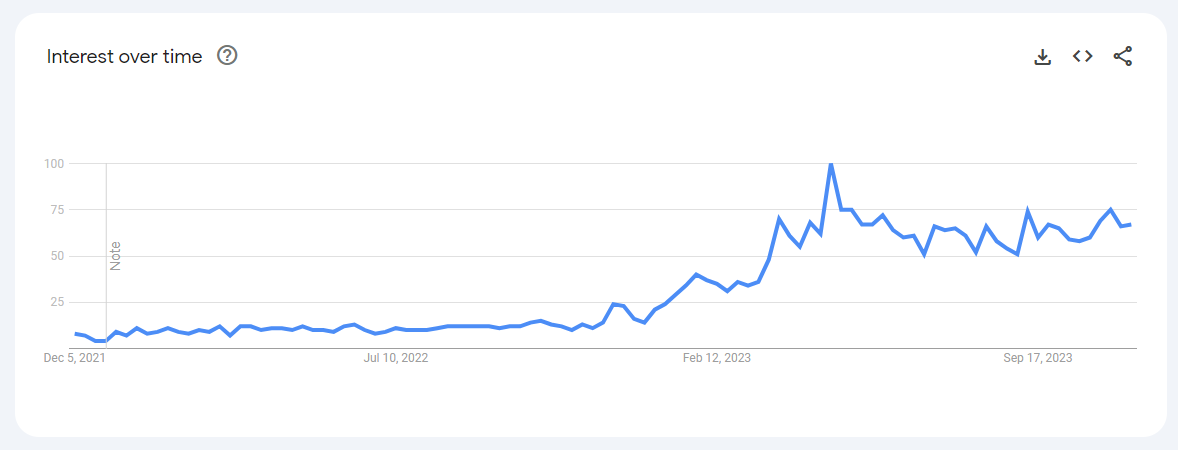
The search interest for "ai jobs" in the United States increased by over 400% from the first period (one year before ChatGPT) to the second period (one year after ChatGPT).
Prompt Engineering
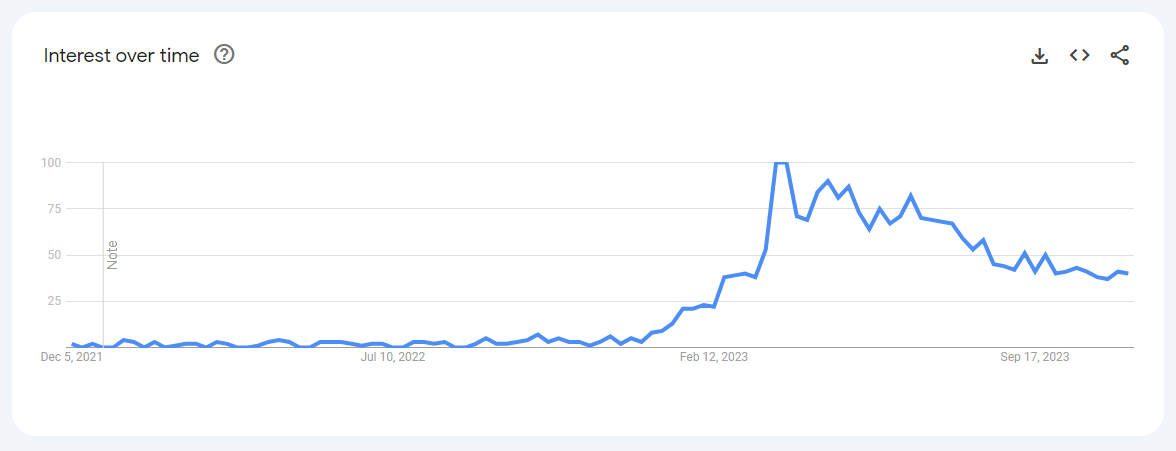
The search interest for "prompt engineering" in the United States increased by over 3,500% from the first period (one year before ChatGPT) to the second period (one year after ChatGPT).
AI Trainer
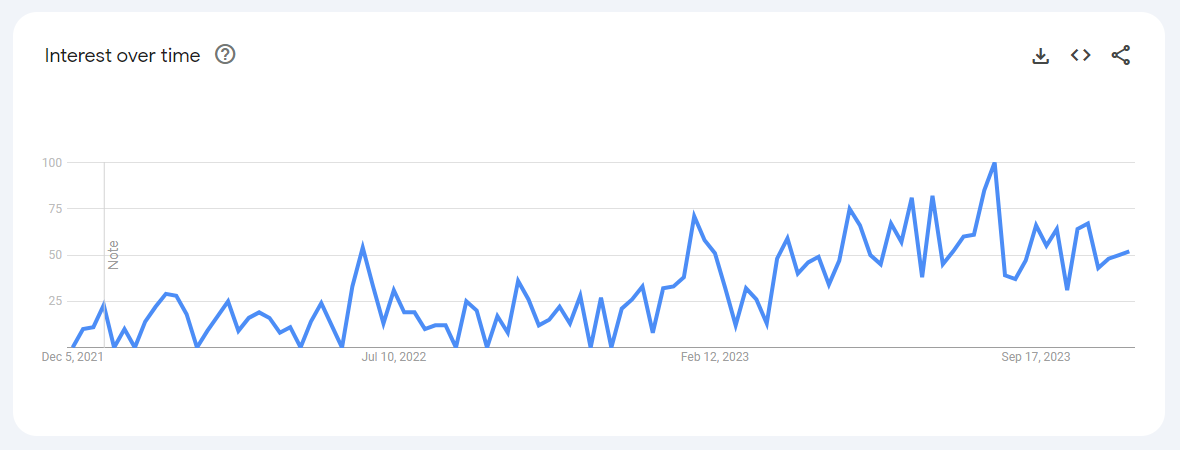
The search interest for "ai trainer" in the United States increased by approximately 250% from the first period (one year before ChatGPT) to the second period (one year after ChatGPT).
Results
The analysis suggests a marked increase in search interest for AI-related jobs. Established AI roles, like AI Trainer, saw significant growth, but it was roles that emerged post-ChatGPT release, such as Prompt Engineering, that showed the most substantial increases. This data supports the hypothesis that AI advancement is driving greater job seeker interest in new AI-related roles.
Hypothesis #2: Diminished interest in remote careers vulnerable to AI-induced obsolescence
As AI and machine learning technologies progress, they become increasingly adept at executing tasks traditionally performed by humans. Jobs with repetitive and patterned tasks are especially susceptible to this change. Consequently, we hypothesize that interest in such professions will decline among job seekers.
To validate this hypothesis, we will review search volume trends for three remote careers particularly vulnerable to AI-induced obsolescence. The keywords selected are customer service jobs, transcription jobs, and data entry jobs
Customer Service Jobs
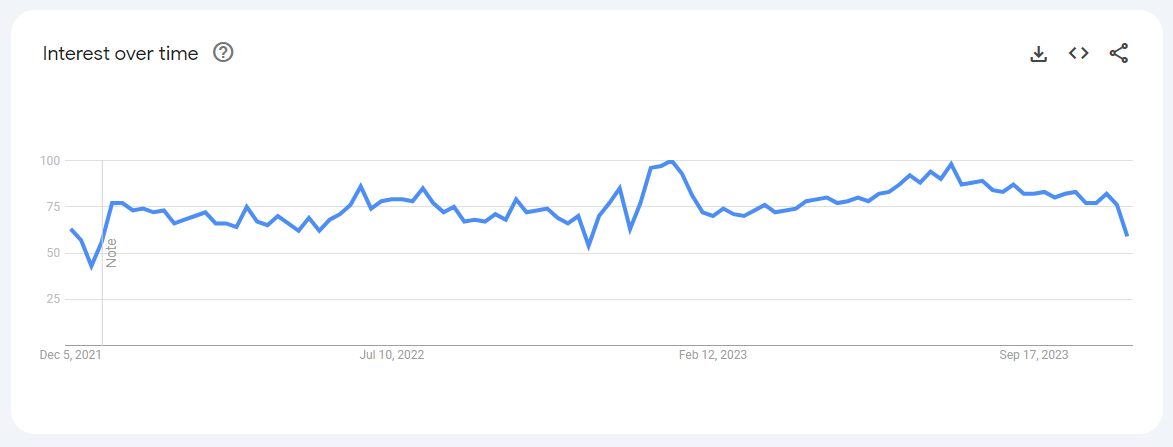
The search interest for "customer service jobs" in the United States increased by approximately 16% from the first period (one year before ChatGPT) to the second period (one year after ChatGPT).
Transcription Jobs
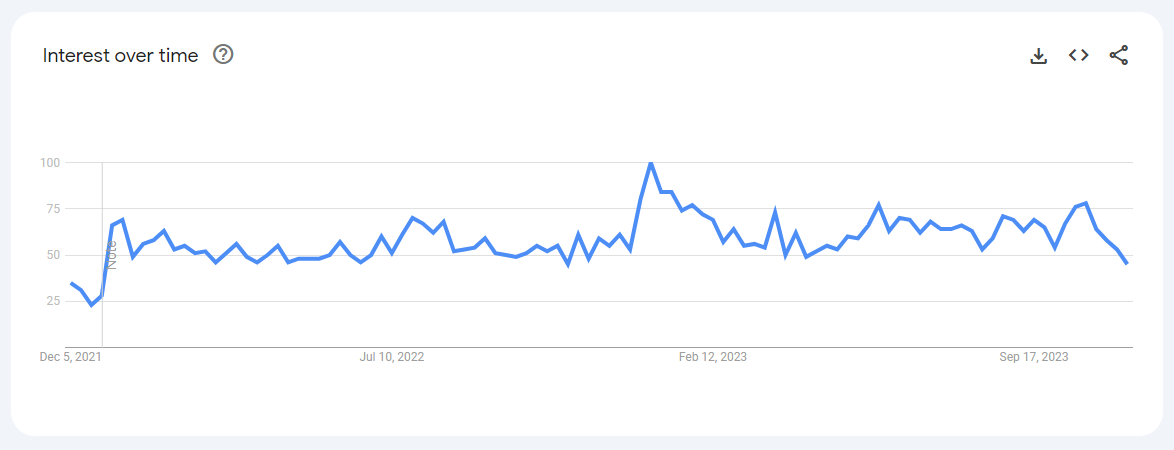
The search interest for "transcription jobs" in the United States increased by approximately 23% from the first period (one year before ChatGPT) to the second period (one year after ChatGPT).
Data Entry Jobs
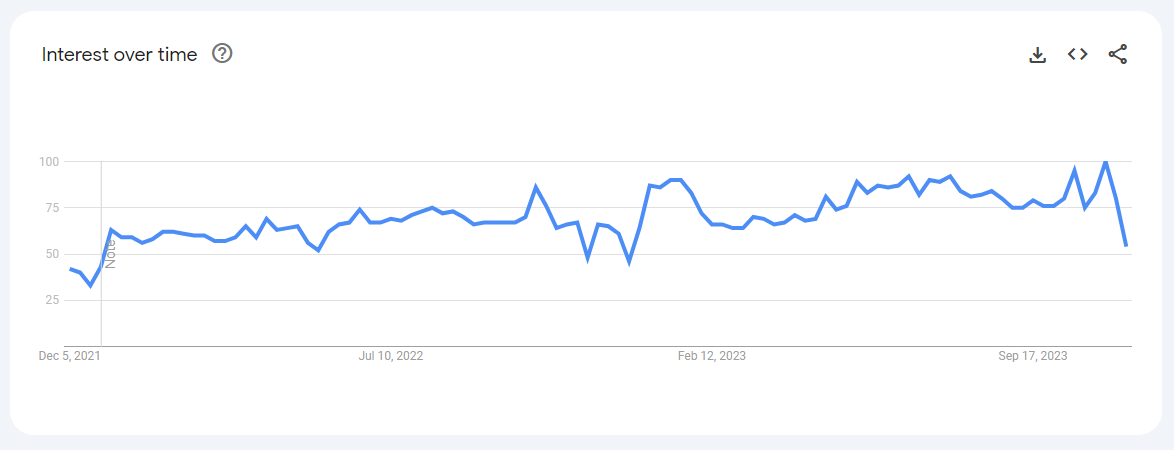
The search interest for "data entry jobs" in the United States increased by approximately 22% from the first period (one year before ChatGPT) to the second period (one year after ChatGPT).
Results
Contrary to expectations, there was an overall increase in search interest for these traditional remote jobs, despite the high risk of obsolescence posed by AI. Therefore, our hypothesis that AI advancements would reduce interest in traditional remote roles at high risk of obsolescence is not supported by the data.
Hypothesis #3: Declining interest in creative fields highly impacted by AI
AI advancements are encroaching on creative domains, with machines now capable of producing art, music, writing, and design. This shift might reduce the demand for human creatives in some sectors, potentially altering job security perceptions and diminishing job seeker interest in these fields. To test this hypothesis, we analyzed search trends for writing jobs, graphic design jobs, and video editing jobs.
Writing Jobs
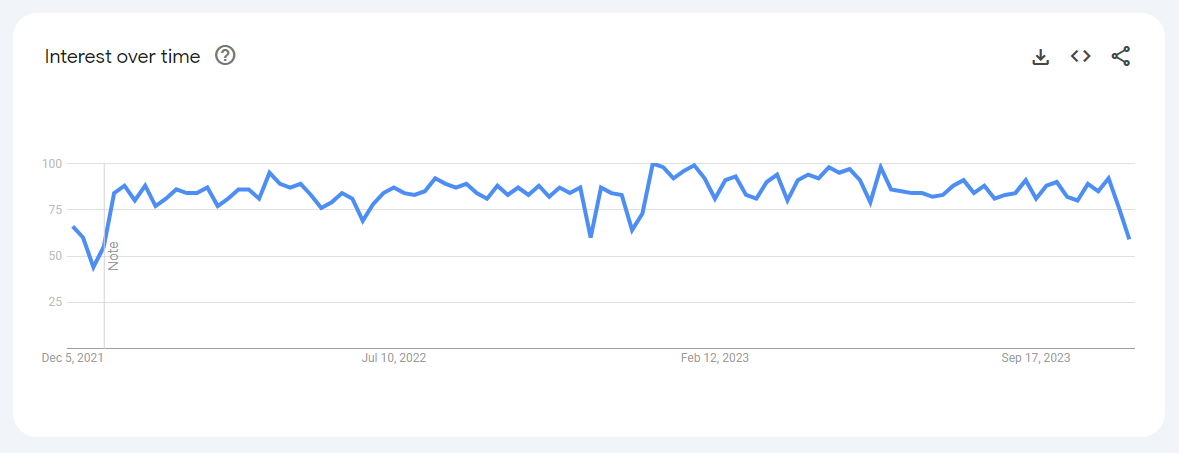
The search interest for "writing jobs" in the United States increased by approximately 6% from the first period (one year before ChatGPT) to the second period (one year after ChatGPT).
Graphic Design Jobs
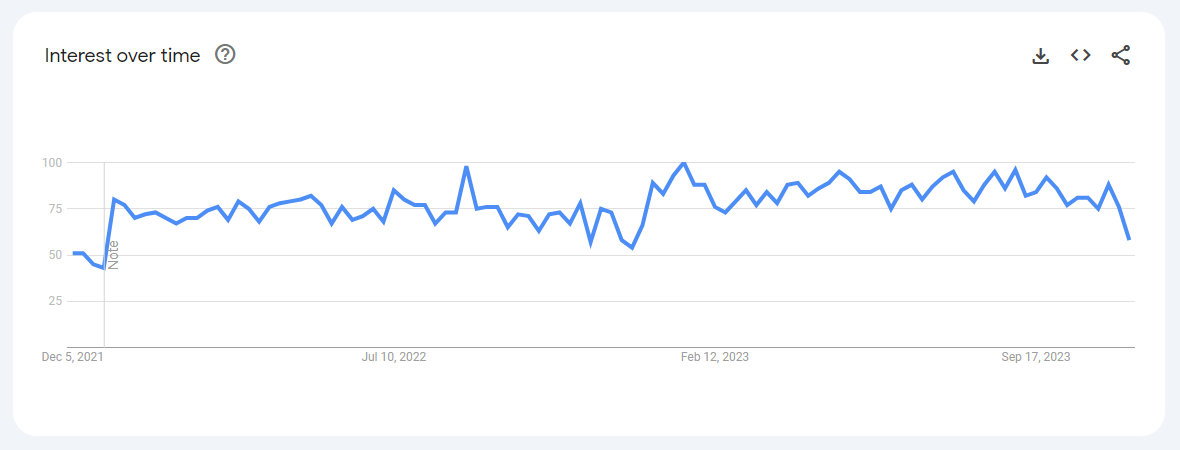
The search interest for "graphic design jobs" in the United States increased by approximately 15% from the first period (one year before ChatGPT) to the second period (one year after ChatGPT).
Video Editing jobs
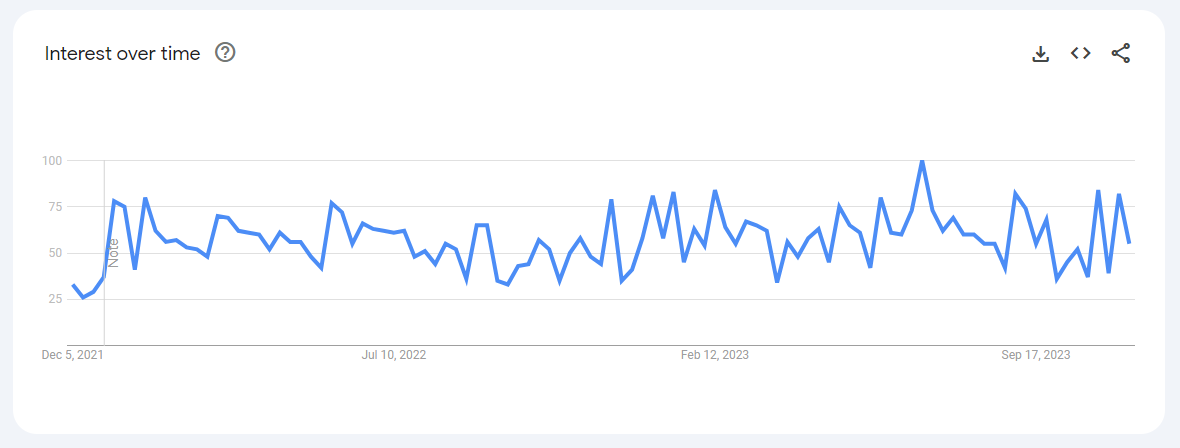
The search interest for "video editing jobs" in the United States increased by approximately 15% from the first period (one year before ChatGPT) to the second period (one year after ChatGPT).
Results
Despite AI's significant impact on creative fields, our analysis reveals an overall increase in search interest for creative digital roles. Thus, the hypothesis that AI advancements would diminish job seeker interest in creative digital professions is not corroborated by our findings.
Hypothesis #4: Increased job seeker interest in AI-related learning and reskilling
The pervasive integration of AI in the workplace will necessitate continuous workforce upskilling. As a result, we anticipate an uptick in job seeker interest in AI-related learning and reskilling. To assess this, we analyzed search trends for three popular AI learning queries: AI course, how to learn AI, and learn AI.
AI Course
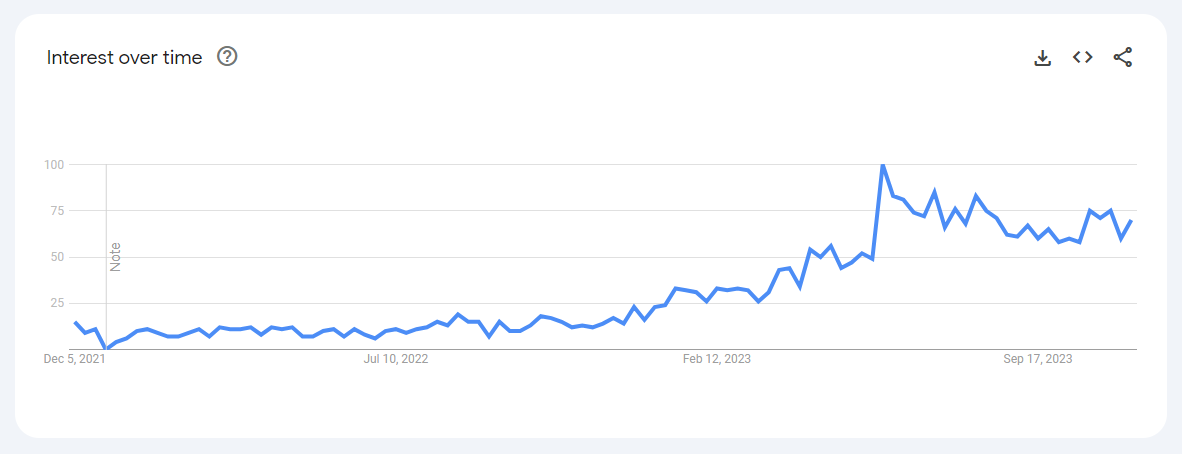
The search interest for "AI course" in the United States increased by over 350% from the first period (one year before ChatGPT) to the second period (one year after ChatGPT).
How to learn AI
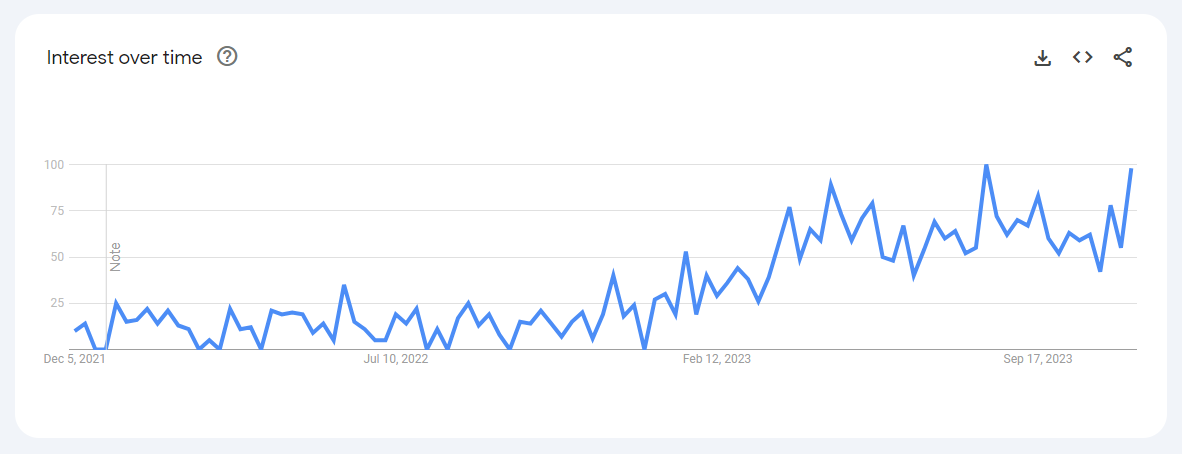
The search interest for "How to learn AI" in the United States increased by almost 300% from the first period (one year before ChatGPT) to the second period (one year after ChatGPT).
Learn AI
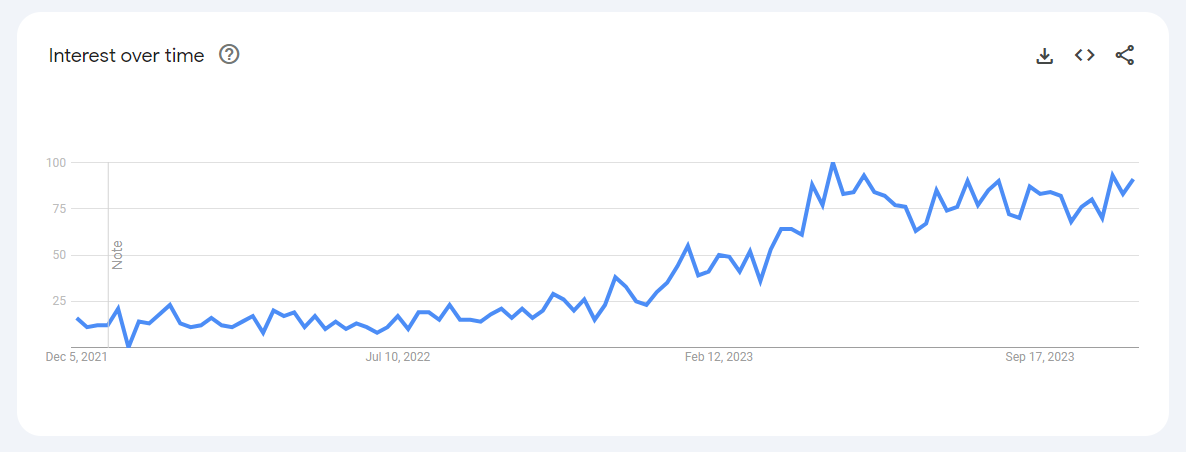
The search interest for "Learn AI" in the United States increased by over 300% from the first period (one year before ChatGPT) to the second period (one year after ChatGPT).
Results
The analysis suggests a significant surge in search interest related to AI learning. This observation, drawn from the web search trends for selected terms, confirms the hypothesis that advancements in AI are driving a growing interest among job seekers in AI-related learning and reskilling opportunities.
Summary of Findings
Based on analysis of selected job seeker web search behavior data in the predetermined time range:
- The hypothesis that there will be greater interest among job seekers in new roles created by the advancement of AI has been confirmed.
- The hypothesis that there will be a decrease in job seekers' interest in traditional remote jobs that are about to become obsolete has been rejected.
- The hypothesis that there will be a decrease in job seekers' interest in creative remote jobs severely impacted by AI has been rejected.
- The hypothesis that there will be greater interest among job seekers in AI-related learning and reskilling has been confirmed.
Our Commentary on the Findings
According to Danilo Godoy, founder and CEO of Wahojobs:
“Although the proliferation of AI has sparked interest in job opportunities that did not exist in the past, it has not had any impact on the search for online jobs that are about to become obsolete. Despite the promise of a transformed job market, there remains a strong gravitation towards these traditional remote roles.
As we stand at the cusp of a job revolution, it's becoming increasingly clear that a significant knowledge gap exists in the workforce. Remote job seekers, clinging to traditional roles, may find themselves unprepared for the jobs of tomorrow. As we move forward, we must seize this opportunity to reshape the educational landscape, ensuring that the labor market is ready and excited for an AI-driven future.”
Update: 6 Months Post-Study, Traditional Remote Jobs Steady as AI Roles Surge
Following our initial study, we conducted additional research to monitor the behavior of previously observed trends in job searches. This update provides insights into how interest in various job roles and learning opportunities has evolved over the past six months.
Continued Trends and Emerging Patterns
AI Jobs: The trend for 'AI jobs' in the United States has shown an upward trajectory since the release of the study, with increasing searches reflecting growing interest.
Prompt Engineering: The trend for 'prompt engineering' has remained relatively stable, indicating consistent interest in this field.
AI Trainer: There has been a significant rise in searches for 'AI trainer,' suggesting heightened interest and demand for this role.
Customer Service Jobs: Interest in 'customer service jobs' has shown no significant change, maintaining steady search levels.
Transcription Jobs: Searches for 'transcription jobs' have declined by approximately 12%, indicating a decrease in interest.
Data Entry Jobs: There was a 9.5% increase in interest in 'data entry jobs' post-November 25, 2023, showing renewed attention to this role.
Writing Jobs: The trend for 'writing jobs' has remained largely unchanged, indicating stable interest levels.
Graphic Design Jobs: Interest in 'graphic design jobs' remained stable, with a slight upward trend, reflecting consistent demand.
Video Editing Jobs: The trend for 'video editing jobs' has been relatively stable compared to the previous period.
AI Learning (AI Course / How to Learn AI / Learn AI): Searches for AI learning topics, including 'AI course' and 'how to learn AI,' have surged by around 67-76%, showing significant growth in interest for AI education and skill acquisition.
Conclusion
Our study shows a job market in transition, where traditional remote roles continue alongside new AI opportunities. These roles remain appealing, possibly due to slower AI adoption in certain sectors.
Our updated research reveals that interest in AI-related roles is surging, with more people seeking AI education and training. The rise in data entry job searches suggests these roles are evolving to include more AI-related tasks, while the decrease in transcription jobs points to a possible decline in traditional transcription work.
Overall, while AI roles are gaining popularity, traditional remote jobs like customer service and writing remain steady, showing their continued importance in the job market despite the increasing focus on AI.
Looking ahead, it's important to monitor if the continuous interest in conventional online jobs is reflected in the availability of these positions. A mismatch—where demand for these roles remains high, but their availability dwindles—could signal a significant challenge. We at Wahojobs remain committed to diligently monitoring how AI continues to impact the remote job market, adapting and informing our strategies accordingly.